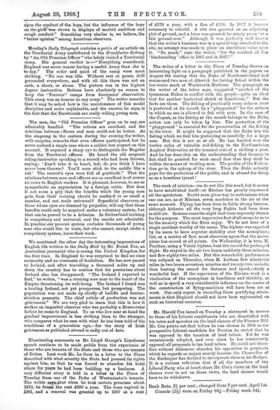The men, the "Old Prussian Officer" goes on to say,
are admirably handled. "The rations are excellent, and the relations between cfficers and men could not be better. At the singsong in the canteen during the evening the writer, with surprise, remarks that even officers participated, but he never noticed a single case where a soldier lost respect on this account. It required a sharp eye to distinguish the Regular from the Territorial officers. He heard the old sergeant riding-instructor speaking to a recruit who had been thrown, saying: Don't take it to heart, lad; do you think I have never been thrown ? You'll soon stick to the saddle like a cat.' The recruit's eyes were full of gratitude." That the relations between men and officers are so excellent is of course no news to English readers. It is pleasant, however, to see so sympathetic an appreciation by a foreign critic. But does it not seem a pity that the benefits which the young men gain from their training should be confined to so small a number, and not made universal? Superficial observers, or those whose eyes are dimmed by prejudice, will say that these benefits could only be acquired under a voluntary system, but that can be proved to be a delusion. In Switzerland training is compulsory and universal, and the results are admirable. In practice our present system excludes thousands of young men who would like to train, but who cannot, except under a compulsory system, leave their work.






































 Previous page
Previous page